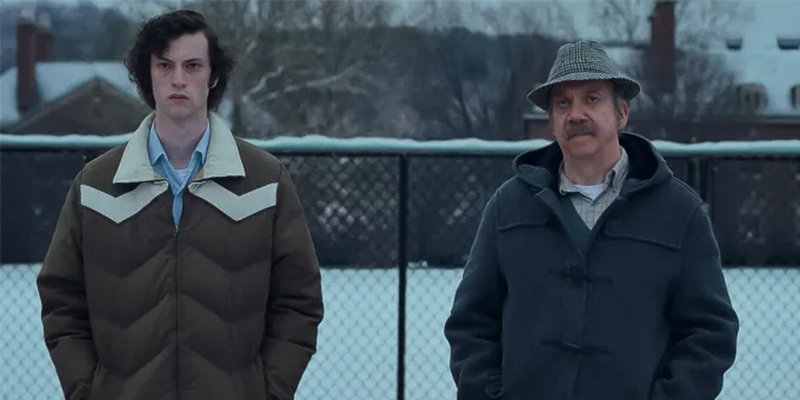
The Holdovers is a Revelation
Alexander Payne's new film is perfect, full stop.
You heard me. The Holdovers is perfect. It’s perfect.
The film opens in a limited release on October 27th and nationwide on November 10th. It is my hope that as many people as possible go to see it—not merely for the film’s success, but because of how wonderful and moving it is. We need movies like this. Go see it. It’s worth the drive, the ticket, the time. Go. Just go. You’ll thank me after, but that’s not the point. This is my gift to you. You should just stop reading now and trust me.
If you want to know a little more about what it’s about, I can oblige. The Holdovers, directed by Alexander Payne from a script by David Hemingson, is set in December of 1970, during the holiday break at Barton, a prestigious New England boys boarding school. Paul Giamatti plays Paul Hunham, a curmudgeonly, veteran teacher (Ancient Civ and Classics) stuck at the school during winter break, assigned to watch over the students who are unable to join their families for the holidays. He’s largely unloved by students and staff alike, save for Mary (Da’Vine Joy Randolph), who runs the cafeteria during the semesters, and who is in charge of feeding the loners left at Barton during the holidays. Paul and Mary have a wry but caring friendship, united in the understanding that most of the students who grace the halls are entitled boys, if not straight-up assholes, who will never face consequences for their attitudes or (lack of) effort after high school.
Hunham thinks he has a good plan to keep the winter strays on a healthy schedule of rule-following and work, but one student, Angus Tully (played by newcomer Dominic Sessa), is not going to make this easy. Left at the school by his mother and new stepfather, who want to turn their family holiday trip to Saint Kitts into an adults-only Honeymoon, Angus is aggrieved, bored, insouciant, and sensitive, plus he’s a chatterbox who can’t help but poke the bear of authority, who is in this case the exasperated Hunham. To say that Hunham has met his match in Angus is an understatement—they are twin flames of angst and depression, alike in their unbiddable and stubborn natures and sharp intelligences. Mary finds herself calling them out equally, just as much as she sympathizes with them. But they provide sparks of liveliness in Mary’s life, too—she has just lost her twenty-year-old-son Curtis, a former Barton graduate who had the grades but not the funds to attend the distinguished college of his choice. Curtis had enlisted in the army, hoping to attend college on the G.I. Bill, but was killed in battle in Vietnam. Mary and Hunham seem to have bonded over the understanding of the sham of institutions like Barton or even the United States, places where dreams of education and success are sold to everyone but rarely given to anyone but the wealthy and connected.
Not in a long time have I watched a film that succeeds so well in combining hysteria with pathos, nostalgia with cynicism, solemnity with irreverence.
To say that Angus, who reveals to Hunham that he has lost his father, finds a father figure in Paul or that the grieving Mary finds a son in Angus is too clunky, too cursory a simplification of this intricate, delicate movie. They are three lonely souls brought together during a painful time of year, healing and hurting in different ways, together.
It is a pentathlon of a film, a mesmerizing, near nonstop parade of achievements; not in a long time have I watched a film that succeeds so well in combining hysteria with pathos, nostalgia with cynicism, solemnity with irreverence. It’s the best holiday movie since Elf, that’s for sure. Hemingson‘s script manages to feel incredibly real while following a perfectly sculpted narrative arc; every quip, every line is its own quiet little masterpiece.
Giamatti’s performance (which includes punctuating every scene with a different Latin phrase) is a triumphant blend of heartrending humanity and trademark saltiness, while Randolph’s is similarly excellent; I found myself completely at her mercy, laughing or crying as she saw fit to command. She has perhaps this film’s hardest job—conveying fathoms of sadness and love while also keeping the two squabbling boys (Hunham and Angus) in check. And Sessa, as Angus, feels so real that you’ll swear you went to school with him, sat next to him as he sulked and mouthed off, passed him in the hall as he goofily ribbed his roommates.
Shot on film with equipment from late 60s and early 70s, The Holdovers is a pantheon of evocative shots and cuts, immersive in its commitment to the exact moment of the story. But touches like this make it feel all the more personal, all the more exquisite. I say it again, The Holdovers is a perfect movie. It’s a phenomenon like the aurora borealis or a solar eclipse or a meteor shower—something we experience in this world that captivates us to the very edge of our limits, reminds us of our humanity and astounds us with the sheer beauty and boundlessness of what that really means.
Olivia Rutigliano
Olivia Rutigliano is an Editor at Lit Hub and CrimeReads. Her other work appears in Vanity Fair, Vulture, Lapham's Quarterly, the Los Angeles Review of Books, Public Books, The Baffler, Bright Wall/Dark Room, Politics/Letters, The Toast, Truly Adventurous, and elsewhere. She has a PhD from the departments of English/comparative literature and theatre at Columbia University, where she was the Marion E. Ponsford fellow. She hosts the podcasst "Culture Schlock" at Lit Hub Radio. She is on instagram at @oldebean, twitter at @oldrutigliano, and bluesky at @oliviarutigliano.bsky.social.



















